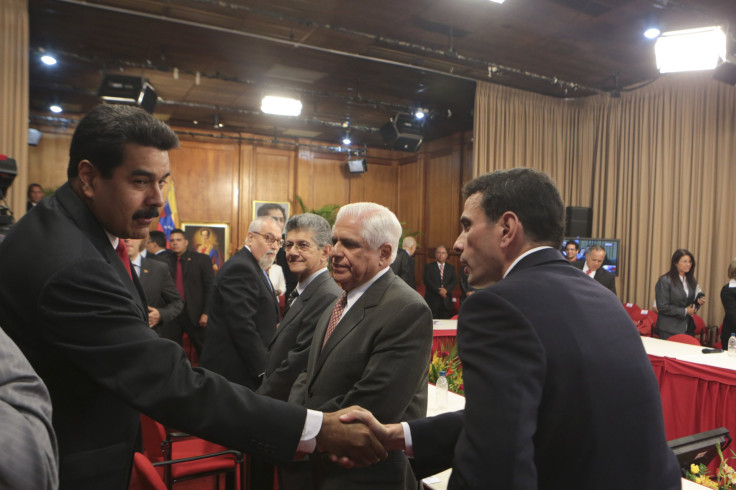
Talks began on Thursday evening between lawmakers in the Venezuelan opposition and the government of President Nicolás Maduro, who hosted the proceedings at the Miraflores presidential palace. The opposition members, which include ex-presidential candidate Henrique Capriles and a handful of leaders with centrist parties, are hoping to win the release of detained opposition lawmakers, the establishment of an independent committee to investigate violence arising from recent protests, and the disarmament of grassroots Chavista colectivos. But Maduro made clear from the start that such wishes would not likely be granted.
"There are no negotiations here. No pacts,” he said. “All we're looking for is a model of peaceful coexistence, of mutual tolerance.” He added, according to the BBC, that though he had called for the dialogue out of a desire to bring a close to protests which have led to the deaths of over 40 people and thousands of arrests, a formal deal with the opposition would make him a “traitor to Chavismo.” And some moments got testy: as Henrique Capriles recounted disputes over the winner of last April’s close-fought elections, National Assembly president Diosdado Cabello tweeted, “The fascist murderer Capriles definitely has problems, he doesn’t understand that he lost the April elections [sic] he’s missing something.”
Capriles, who in announcing earlier that he would attend the dialogue had warned that “when it’s our turn to talk, [the palace] will shake, because we’re going to tell the government the truth,” told members of the Maduro administration -- and the South American ambassadors who helped organize the talks -- that he had decided to attend because he felt the country was in an “absolutely critical situation.” He demanded “respect” for the country’s constitution and an end to what he called the persecution of other opposition sectors. “How can you ask for respect if you don’t respect others?” he said, addressing Maduro. "How can you ask the country to accept you if you call half of the country fascist? It’s very difficult to govern a country with half of it against you.”
© 2025 Latin Times. All rights reserved. Do not reproduce without permission.





